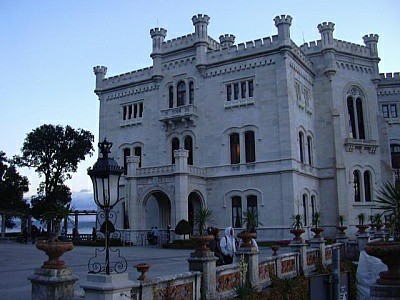[亨利梅因:国际法Lecture6]LECTURE VI. THE DECLARATION OF PARIS.One point of considerable interest in International Law is the very different degree of durability which the various parts...+阅读
LECTURE III. STATE SOVEREIGNTY
I now propose to occupy you with a group of questions arising out of a subject of much interest and magnitude —— the Sovereignty of states over land and water. I will first quote a definition of Sovereignty which would fairly, I think, satisfy the jurists of the present day. It is taken from an excellent book by the late Mr. Montague Bernard, of which the title is, 'The Neutrality of Great Britain during the American Civil War.' The definition is primarily a definition of a Sovereign State. 'By a Sovereign State,' says Mr. Bernard, 'we mean a munity or number of persons permanently anised under a Sovereign Government of their own, and by a Sovereign Government we mean a Government, however constituted, which exercises the power of making and enforcing law within a munity, and is not itself subject to any superior Government. These two factors, the one positive, the other negative, the exercise of power and the absence of superior control, pose the notion of Sovereignty and are essential to it.'
It is necessary to observe that the conception of Sovereignty went through several changes before it became capable of this deion. The view of Sovereignty taken by the earliest international jurists in the sixteenth and seventeenth centuries appears tome to be taken from Roman Law. It is at bottom dominium dominion, ownership. We should not be far wrong in saying that these writers regard the civilised world as a space of soil divided between a number of Roman proprietors; much of their language is taken directly from Roman Law; and, as usual, it is taken particularly from those rules of the Roman system which the Romans themselves believed to be identical with the rules of the Law of Nature. Many fundamental principles are explained by this view. Thus all States, in International Law, are regarded as equal. As a writer of the last century said, Russia is regarded as is Geneva; and in the same way so would a set of Roman owners be regarded as equal before the law. Again, International Law pays regard to Sovereigns only, it does not regard any other part of the munity any more than a Roman tribunal would regard the sles and freedmen of a Roman estate. I think too that these jurists, on the whole, regard the Sovereign as an individual man. It is true that so many of them belonged to the few republics then existing, and specially to the United Provinces of the herlands, that they were of course aware of the necessity of occasionally contemplating the Sovereign as a corporation; but on the whole the view which is at the basis of their conception is that the Sovereign is an individual; and sovereigns are regarded by these lawyers as absolute and not merely paramount owners of the states which they govern. They do not fool; below the existing Prince or Ruler, who had been originally a man exercising despotic power. Further, Sovereignty is at this date always associated with a definite portion of the earth's surface.
But Sovereignty, or what corresponded in ancient time most nearly to it, was not primitively associated with all these ideas; they took the place of other ideas of older date. Thus Sovereignty was not always territorial; it was not always associated with a definite portion of the earth's surface. I he pointed out, in the work from which I he several times quoted, that the older ideas are reflected in the titles of the earliest Monarchs in Western Europe. These were Rex Anglorum, Rex Francorum, Rex Scotorum —— King of the English, King of the Franks, King of the Scots. And one of the most pathetic figures in history is still always known to us as the 'Queen of Scots.' Evidently the fundamental conception was that the territory belonged to the Tribe, and that the Sovereign was Sovereign of the Tribe. The fact is that the feudalisation of Europe had to be pleted before it was possible that Sovereignty could be associated with a definite portion of soil. The investigation of the process which we call feudalisation does not belong to this branch of Historical Jurisprudence: but there is no doubt that in the long run Sovereignty came always to be associated with the last stage of this process. The lawyers on the whole regard Sovereignty as the Sovereignty exercised by individuals, and the result was extremely important to International Law, for the assumed individuality of sovereigns enabled its founders to regard states as moral beings bound by moral rules. If the units of the International system had continued to be what they apparently were at first, tribes or collections of men, it is doubtful whether that system could he been constructed, and at all events, whether it could he taken its actual present form.
Some of the words in Mr. Bernard's definition reflect a much later influence upon law —— e.g. that of Mr. John Austin. He gives to the position that a sovereign Government cannot be controlled by another, an importance which can hardly be said to belong to it in International Law. The position is, in fact, indispensable in Austin's system. There is, in his view, an all-powerful portion of every munity which can do what it pleases as regards the rest, and this all-powerful portion or Sovereign is the author of law. No objection can be taken to it from the view of Austin's theory; but it should be always carefully remembered in our branch of jurisprudence that Mr. John Austin's definition of Sovereignty is not that of International Law, though in almost all the very modern treatises which he dealt with this subject solve confusion between the two is observable. It is necessary to the Austinian theory that the all-powerful portion of the munity which make laws should not be divisible, that it should not share its power with anybody else, and Austin himself speaks with some contempt of the semi-sovereign or demi-sovereign states which are recognised by the classical writers on International Law. But this indivisibility of Sovereignty, though it belongs to Austin's system, does not belong to International Law. The powers of sovereigns are a bundle or collection of powers, and they may be separated one from another. Thus a ruler may administer civil and criminal justice, may make laws for his subjects and for his territory, may exerc

ise power over life and death, and may levy taxes and dues, but nevertheless he may be debarred from making war and peace, and from hing foreign relations with any authority outside his territory. This in point of fact is the exact condition of the native princes of India; and states of this kind are at the present moment rising in all the more barbarous portions of the world. In the protectorates which Germany, France, Italy, and Spain he established in the Australasian seas and on the coast of Africa, there is no attempt made to annex the land or to found a colony in the old sense of the word, but the local tribes are forbidden all foreign relations except those permitted by the protecting state. As was the declared intention of the most powerful founder of protectorates of this kind, Prince Bismarck, if they were to resemble anything they were to resemble India under the government of the East India pany.
As a matter of fact nearly all the modern writers on International Law do divide the rights flowing from the Sovereignty of states into groups. Their distribution of those rights is not uniform, and some of their divisions are more defensible than others. Grotius divided the law of which he wrote, as is known from the title of his book, into law of war and law of peace; and writers of our day, following this distribution, but falling into an error into which Grotius did not fall, classify all the rights of states as rights of war and rights of peace. Some modern publicists make a more general division into two classes; first, primary rights or absolute rights, and in the second place conditional or hypothetical rights; the first being the rights to which a state is entitled as an independent moral body, or in other words that to which it is entitled during peace; the conditional rights being those to which it is entitled when placed in special circumstances, the special circumstances contemplated being war. The subject of rights and duties, arising in a condition of war, will be taken up at a different point of this course, and to-day we will confine ourselves to the absolute or primary rights, those which a state possesses during peace. I observe in modern writers a tendency so to state this part of the law, and so to argue, as to suggest that these absolute rights are nothing more than those which may be logically inferred from the mere fact that a state has existence. This is very simply put in the account of the same class of rights which is given by the author of a valuable work on International Law, Mr. Hall. He says: 'Under the conditions of state life the right to continue and develop existence gives to a stare other classes of rights. These are: first, to anise itself in such manner as it may choose; secondly, to do within its dominions whatever acts it may think calculated to render it prosperous and strong; thirdly, to occupy unappropriated territory and to incorporate new provinces with the free consent of the inhabitants, provided that the rights of another state over any such province are not violated by its incorporation. Thus with regard to the first power or right which is alleged to reside, by the nature of the case, in a sovereign state, the power of anising itself in such a manner as it may choose, it follows that such a state may place itself under any form of government that it wishes, and may frame its social institutions upon any model. To foreign states, the political or social doctrines which may be exemplified in it, or which may spread from it, are legally immaterial.'
This is correct law, and in our day I do not doubt that to most minds it would seem plain that, the condition of Sovereignty being taken for granted, these rights so stated follow. But, as a matter of fact, confining ourselves to this branch of state powers, none he been more violently denied or disputed; and if they were preserved it is far less owing to their logical connection with the definition of state Sovereignty, than from the fact that, from the very first, the position that they exist has been plainly stated by the international lawyers. And the fact that these rights he been preserved is a signal tribute to the importance of International Law. It happens that the long peace which extended from 1815 to 1854 was, both at its beginning and at its end, all but broken up by the denial of these simple rights of which I he been speaking. The pacification of the Continent, after the overthrow of the French Empire, was succeeded by a series of movements instituted by munities for the purpose of obtaining Constitutions; that is, for guarding against being remitted to the same condition of despotic rule in which the French Revolution had found them. All these Constitutions had for their object the limitation of the powers of the King. Perhaps the most democratic of them was the one known as the Spanish Constitution of 1812. When in fact the Spanish Cortes at Cadiz framed this Constitution, Ferdinand, the King of Spain, was in the hands of the French; and therefore the Spanish Constitution-makers had to contemplate a Constitution suitable to a country from which the King would be, perhaps, permanently absent. Naturally, therefore, the powers of the King were in this Constitution reduced to very little. The King of Spain, on his return from imprisonment, denounced this Constitution, but it obtained great four in certain parts of Europe, and in 1820 the Neapolitans, after a revolution, pelled their King to grant a Constitution which was a copy of it. Much dismay was caused to the Continental Powers which retained their despotisms, and the Congresses of Laybach and Troppau assembled to consider the danger of the spread of what were then known as 'French principles' from Naples to the rest of Europe. It was finally determined that the Neapolitan Constitution should be modified, and that pulsion should be put on the not very reluctant King by the arms of Austria. Great Britain, however, protested against the decision. Soon afterwards the Constitution of 1812 was adopted after a military rising in Spain itself. This led to the assemblage of the Congress of Verona and to the restoration of the Spanish despotism, the pulsion on this occasion being put upon Spain by France
以下为关联文档:
亨利梅因:国际法Lecture14LECTURE XII. PROPOSALS TO ABATE WAR.To this last lecture of the present course, it seems to me desirable that I should briefly notice some assertions or suggest...

亨利梅因:国际法Lecture7LECTURE VII. THE MITIGATION OF WAR.The age in which International Law was born was an age of land wars. The wars of succession and of feudal ascendancy had par...

亨利梅因:国际法Lecture4LECTURE IV. TERRITORIAL RIGHTS OF SOVEREIGNTY.All the department of International Law with which I was occupied at the close of my last lecture, the acquisition...

亨利梅因:国际法Lecture9LECTURE IX. RULES AS TO PRISONERS AND QUARTER.At the close of my last lecture I spoke of the Geneva Convention of 1864 as the farthest, as well as the most rece...

亨利梅因:国际法Lecture13LECTURE XI. RIGHTS OF CAPTURE BY LAND.In all modern books on this subject there is more or less distinct condemnation of unauthorized pillage by the soldiers o...

亨利梅因:国际法Lecture8LECTURE VIII. THE MODERN LAWS OF WAR.In my last lecture I explained the detestation which newly-invented instruments of war sometimes occasioned in olden days,...

亨利梅因:国际法Lecture11It is suggested by several of the international writers, and it is probable, that armistices first arose from the truce or truces of God which were repeatedly pro...

亨利梅因:国际法Lecture5LECTURE V. NAVAL OR MARITIME BELLIGERENCY.To sum up what I he been saying. I he been discussing certain legal fictions which are signified through legal metaph...

新东方背诵文选80篇:23亨利·福特HenryFord23 Henry Ford Although Henry Ford's name is closely associated with the concept of mass production, he should receive equal credit for introducing labor practic...



